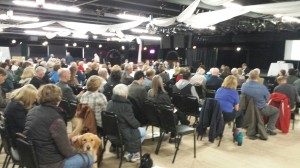Public Hearing on Hollydale Xmsn Project
November 11th, 2013
Today we had a very well attended public hearing on the Hollydale Transmission Project. This is important because it’s a project proposed, end to end, to ram through a residential area, precisely where transmission doesn’t belong. Worse, this is a Certificate of Need proceeding, and there is no need, only desire. What do I mean by that? In transmission, there’s this legally congnizable thing called “need” where the utility has to demonstrate a specific need for the project, say 500 MW of transfer capacity, or a 500 MW line to handle an outage on Line X, or to interconnect 500 MW of big honkin’ coal plant generation. This project, on the other hand, has demonstrated need only for some measure of distribution expansion, and that’s it. N-O-T-H-I-N-G about ransmission, they just say they “need” it, and folks, that ain’t good enough. There are many ways to handle the claimed “need” for distribution, both demand side and supply side:
Commerce wanted an extension of time to file testimony (why?), and wanted to have “discussions.” OK, fine… the evidentiary hearing scheduled for November 12-15 was postponed, with scheduling to be worked out. Then we met on Wednesday. Oh my… Commerce had said they wanted discussions, and that they wanted to see if there were settlement options, alternatives. Nope, none of that, there were not discussions, no settlement options discussed, in fact, Commerce didn’t discuss as much as cross examine us, looking for “differences of opinion.” Never talked of settlement options, though we did show them that there are areas of agreement that they’d not expected. It was also distressing the way that Commerce’s Santo Cruz (how long has he been there? Not long!) was framing the discussion, there’s green showing, and I don’t mean in a conservationist sense:
Why was Cruz, someone with what, maybe a week with Commerce, chosen to lead the discussion? He’d clearly not looked at how PUC dockets that go to a statutory interpretation proceeding work, or more accurately, don’t work! When Commerce calls a meeting because they have issues with “interpretation” (so it was said), why instead of discussing “issues,” would he cross-examine us instead? The point?
Why was Bill Grant there? To execute on the Gov’s orders? Which are??? He has no experience with transmission other than to cave to utility dreams and accept money for Wind on the Wires, coordinate lobbying efforts for transmission Remember Grant’s transmission Settlement Agreement PUC Docket -2-2152 and his cohort saying about the 2005 Chapter 97 – Transmission Omnibus Bill from Hell, “it’s a deal, it’s a package deal, and it’s a good deal.” I wasn’t there at the House caucus meeting but I got two separate reports… and anyone supporting something like that bill has no business being in the position he is in at Commerce, over both “need” and “routing” of transmission. There’s no excuse, Dayton might as well directly appoint a key Xcel Energy lobbyist.
Oh well. Sen. Bonoff was at that meeting to “clarify” intent, which is pretty clear, the language is not complicated:
Sec. 2. TRANSMISSION LINE; CERTIFICATE OF NEED REQUIRED AND
EVIDENCE REQUIRED.(a) A high-voltage transmission line with a capacity of 100 kilovolts or more proposed to be located within a city in the metropolitan area as defined in Minnesota Statutes, section 473.121, subdivision 2, for which a route permit application was filed between June 2011 and August 2011, and a certificate of need application was filed between June
2012 and August 2012, to rebuild approximately eight miles of 69 kilovolt transmission with a high-voltage transmission line to meet local area distribution needs, must be approved in a certificate of need proceeding conducted under Minnesota Statutes, section 216B.243. The certificate of need may be approved only if the commission finds by clear and convincing evidence that there is no feasible and available distribution level alternative
to the transmission line. In making its findings the commission shall consider the factors provided in applicable law and rules including, without limitation, cost-effectiveness, energy conservation, and the protection or enhancement of environmental quality.(b) Further proceedings regarding the routing of a high-voltage transmission line
described in this section shall be suspended until the Public Utilities Commission has
made a determination that the transmission line is needed.EFFECTIVE DATE.This section is effective the day following final enactment and
applies to route permits and certificate of need applications pending on or after that date.
Presented to the governor May 9, 2013
Signed by the governor May 13, 2013, 2:57 p.m.
At Thursday’s public hearing, both Sen. Bonoff and Rep. Anderson, the Plymouth area legislators, made it very clear the intent of the law…
And just before the hearing, while in transit, Commerce sent the following missive, in pertinent part:
The Department at this point has decided that it will not seek certification of remaining statutory questions, but recommends that a trial date and accompanying testimony schedule be established. Setting a January trial date, as proposed this morning by Ms. Maccabee, makes sense although the Department would request that the date be moved to the week of January 20th or the week of January 27th, in that the CenterPoint general rate case will take place on January 14-17, 2014. In this manner, the uncertainty that remains will be fleshed out in the record, to provide more information for decision-makers to determine how best to address the issues in this proceeding.
Good…
The evidentiary hearing on Hollydale is postponed, and now has been rescheduled for the week of January 6, 2014. Here we go!

Leave a Reply